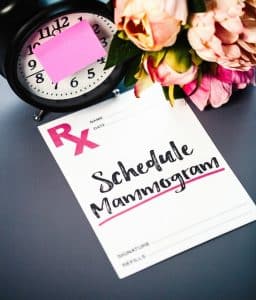When to Start Breast Cancer Screening

When Should I Start Getting Mammograms?
A mammogram, or breast cancer screening, is the single most useful test a woman can take to detect breast cancer in its earliest stages. Since one of eight women will be diagnosed with breast cancer in her lifetime, it’s important to start screenings early to not only detect abnormalities, but to also have a record of what your healthy breast tissue looks like for comparison purposes with future tests.
The American Cancer Society suggests the following timeline for women to begin annual mammograms (x-ray testing):
- Women aged 40 to 44 should get their first breast cancer screening
- Women aged 45 to 54 should get a mammogram every year
- Women 55 and above can change to annual or biannual mammograms if they choose
- Older women in good health should continue to get a breast cancer screening if she expects to live another 10 years
A small percentage of women are at greater risk of developing breast cancer due to family history, genetic markers, and other lifestyle factors. These women may be advised by their doctors to undergo additional breast cancer testing, such as an MRI, to aid in breast cancer detection.
Additional Cancer Tests for Women’s Health
In addition to breast cancer, women are at some risk for the following cancers and should consider undergoing testing for early detection:
Cervical Cancer – Women should get their first test for cervical cancer starting at age 21. The test is called a Pap smear - when a doctor obtains a sample of cervical cells to examine for abnormalities.
Further guidelines for Pap smears include:
- No testing for women under 21
- Testing every three years for women aged 21 to 29
- Issuing an HPV test every five years for women aged 30 to 65
- No testing for women aged 65 and older who’ve had normal tests for the previous 10 years
- No testing for women who’ve had a total hysterectomy
Uterine Cancer – Women should be told of their risks and symptoms of uterine (endometrial) cancer when they reach menopause. Women should alert their doctors to abnormal vaginal bleeding and spotting. Based on this information and other health history, menopausal women may be advised to undergo endometrial biopsy.
Colon and Rectal Cancer – Starting at age 50, women should undergo one of the following tests to check for colon cancer and polyps:
- Colonoscopy with a repeat test in 10 years
- CT colonography every five years
- Stool DNA testing every three years
- Barium enema every five years
- Fecal occult blood testing annually
Lung Cancer – Lung cancer screening is not recommended for women at average risk. Yet, women aged 55 to 74 who still smoke, have smoked two packs of cigarettes a day for any 15-year span, or one pack a day over any 30 year span should undergo a lung CT scan.
Stop by PURE Mammography in Lake Grove on Long Island for your next breast cancer screening. We offer the latest 3D mammograms in a soothing, compassionate, spa-like setting. Contact us for more information today.